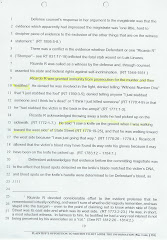Read JohnTorell's comments,Mr Torell was formerly the auditor for Santa Barbara County for 12 years before coming here.
http://www.allbusiness.com/government/government-bodies-offices-government/10581680-1.html
Accounting For A Crisis: City Auditor Leads Overhaul Of Outdated Financial System
By Allen, Mike
Publication: San Diego Business Journal
Date: Monday, January 16 2006
You are viewing page 1
While the spotlight on San Diego's ongoing financial crisis remains on the city's pension deficit of some $1.4 billion, the underlying cause for the city's problems stems from a systemic failure to fully disclose its financial information, said City Auditor and Comptroller John Torell.
Appointed in March to replace former Auditor Ed Ryan, who resigned in February 2004, Torell is spearheading an overhaul of a financial reporting system he called chaotic and antiquated.
"What got us into trouble was not because of a large pension deficit. A lot of organizations have large pension deficits. It was because we didn't tell the truth in our financial statements," Torell said.
"We didn't give full, adequate disclosure about the financial bind that we're in. We glossed over it."
At the center of the non-disclosure is the city's 2003 consolidated annual financial report. The annual report must be filed as a requirement of the city's issuing municipal bonds that investors advance in return for annual interest payments.
Errors And Omissions
In January 2004, the city disclosed to a number of national securities information repositories a series of errors and omissions in its 2003 fiscal year report for the year ended June 30, 2003.
The documents essentially admitted that earlier disclosed liabilities of its employee pension fund and its wastewater system were not accurate. Because of changes in the city's contributions (as a result of two under-funding decisions by the City Council and the retirement board) to its employee pension fund, the city's unfunded liability could fall to 65 percent and total as much as $2.4 billion in the coming years, according to disclosure documents dated Jan. 27, 2004.
Shortly after the disclosures were filed, investigations by the Securities and Exchange Commission, the U.S. attorney's office, and the district attorney's office were launched. Two bond rating agencies downgraded ratings on outstanding city bonds, and a third agency, Standard & Poor's, halted any review of its debt until the city delivered audited annual financial reports.
The investigations led to criminal indictments by the district attorney's office of five former members of the city's retirement board in May. On Jan. 6, the U.S. attorney's office announced grand jury felony indictments of three former pension board members, its former attorney and its chief administrator. Three of the recently charged were also indicted in the state case.
Federal officials said the investigation into the pension debacle is continuing, which some interpret as meaning additional indictments will follow.
The arcane language contained in the city's disclosure documents make it difficult to ascertain the scope of the past errors, but Torell estimated the net total in the 2003 report to be $600 million
Help Wanted
Faced with an inability to issue new debt, mainly because of the lack of current annual financial reports, the city has attempted to rectify the situation by hiring a host of accounting and legal consultants. Through last month, the cost for these consultants had risen to $26 million, according to the city auditor's office.
As part of its remediation effort, the city
adopted an ordinance in October 2004 to go beyond merely providing financial reports, but to achieve a higher standard in its financial disclosures, including requiring an annual evaluation of the city's internal control system.
The City Council adopted a law that was like a "mini-SarbanesOxley," the accounting reform law passed in 2002 in response to some high-profile corporate accounting scandals, to
show regulators its intention to create a more transparent accounting of its financials, said Torell, who was the auditor for Santa Barbara County for 12 years before coming here.
"What they want to do is assure that the processes and controls that we have in place will ensure that we have accurate and timely financial statements," he said.
Based on Torell's report released Jan. 1,
the city has a lot of work to do.
The report states that the current controls over its financial reporting are inadequate; that its outdated business processes are manually intensive and prone to error, its staff is not sufficiently trained; and the financial reporting system needs automating.
The most important aspect of resolving the problem rests with the city's elected officials and top managers to foster a more open environment for staffers to do their jobs, Torell said.
The city should eliminate an "authoritarian control environment" in managing its staffers so they won't hesitate in speaking out when they feel something isn't being done correctly, the report states.
"The people around here have been told to 'sit down and shut up.' That's been the general rule," he said.
Among the steps Torell has already implemented is setting up a computerized financial reporting system at a cost of about $75,000.
Other remediation steps proposed in the report are establishing a new position of chief accountant; providing ongoing professional training for managers and clerical staff, in addition to biannual ethics training for all staffers; and establishing an employee hot line for staffers to provide anonymous input on perceived problems.
Fred Sainz, a spokesman for Mayor Jerry Sanders, said Sanders read Torell's report and is aware of his proposed solutions.
Once newly hired CFO Jay Goldstone begins his job, he will conduct an assessment of all the departments that report to him, including the auditor's office, and implement steps to improve operations, Sainz said.
Torell, who oversees a staff of 97 and an annual budget of $9.8 million this year, wasn't sure of the total cost for all the planned steps, but said he's already cut I I positions from his department's payroll resulting in an annual saving of about $1.6 million.
Sunday, June 27, 2010
Subscribe to:
Post Comments (Atom)






No comments:
Post a Comment